Expert Answer and Explanation
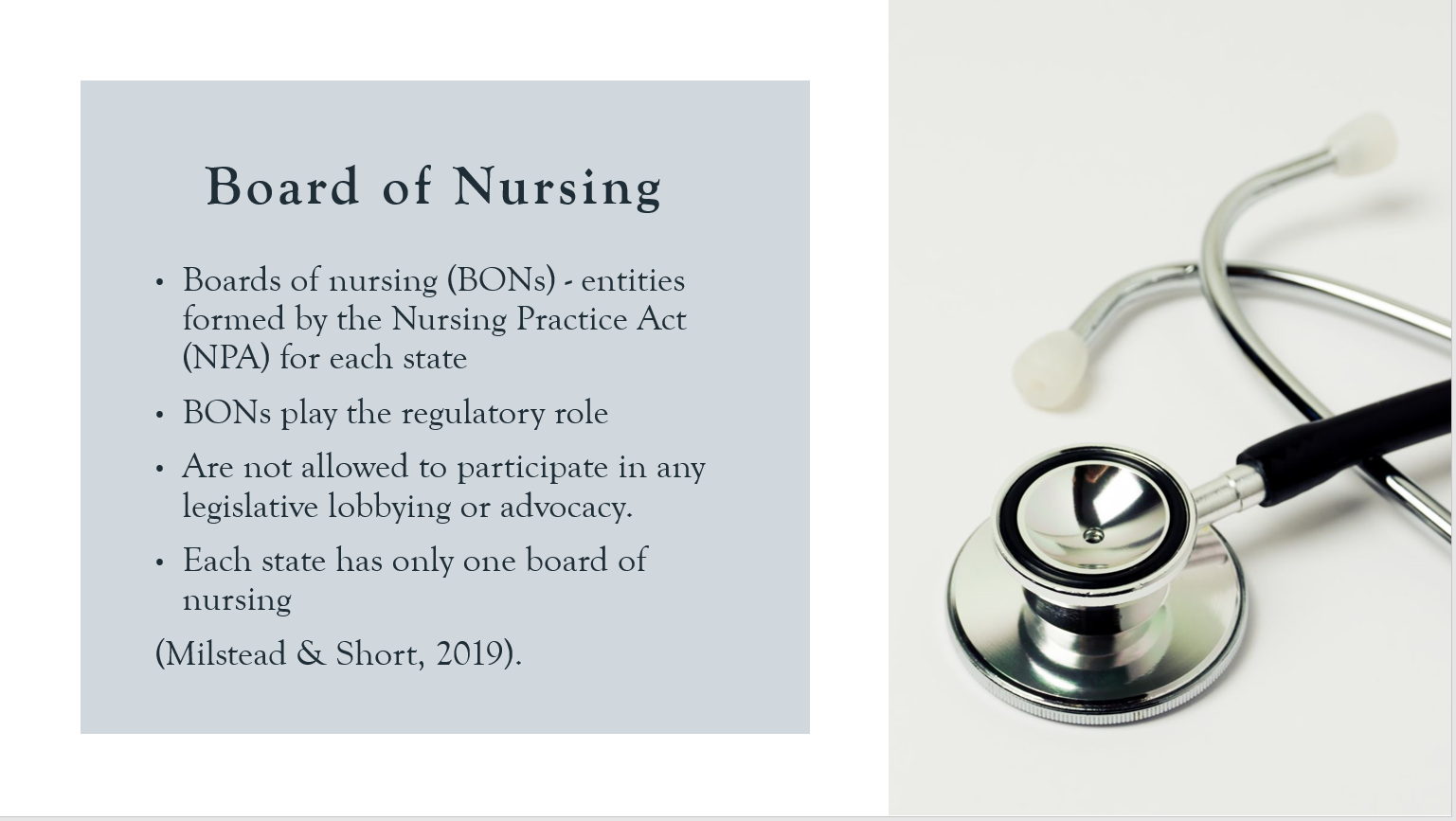
Boards of nursing (BONs) are entities formed by the Nursing Practice Act (NPA) for each state in the United States. BONs specifically play the regulatory role and provides oversight in nursing practice in accordance with the NPA (Milstead & Short, 2019). BONs are not allowed to participate in any legislative lobbying or advocacy. BONs members are usually selected by the governor with participation of the state senate and input from other stakeholders in the healthcare industry. Each state has only one board of nursing.
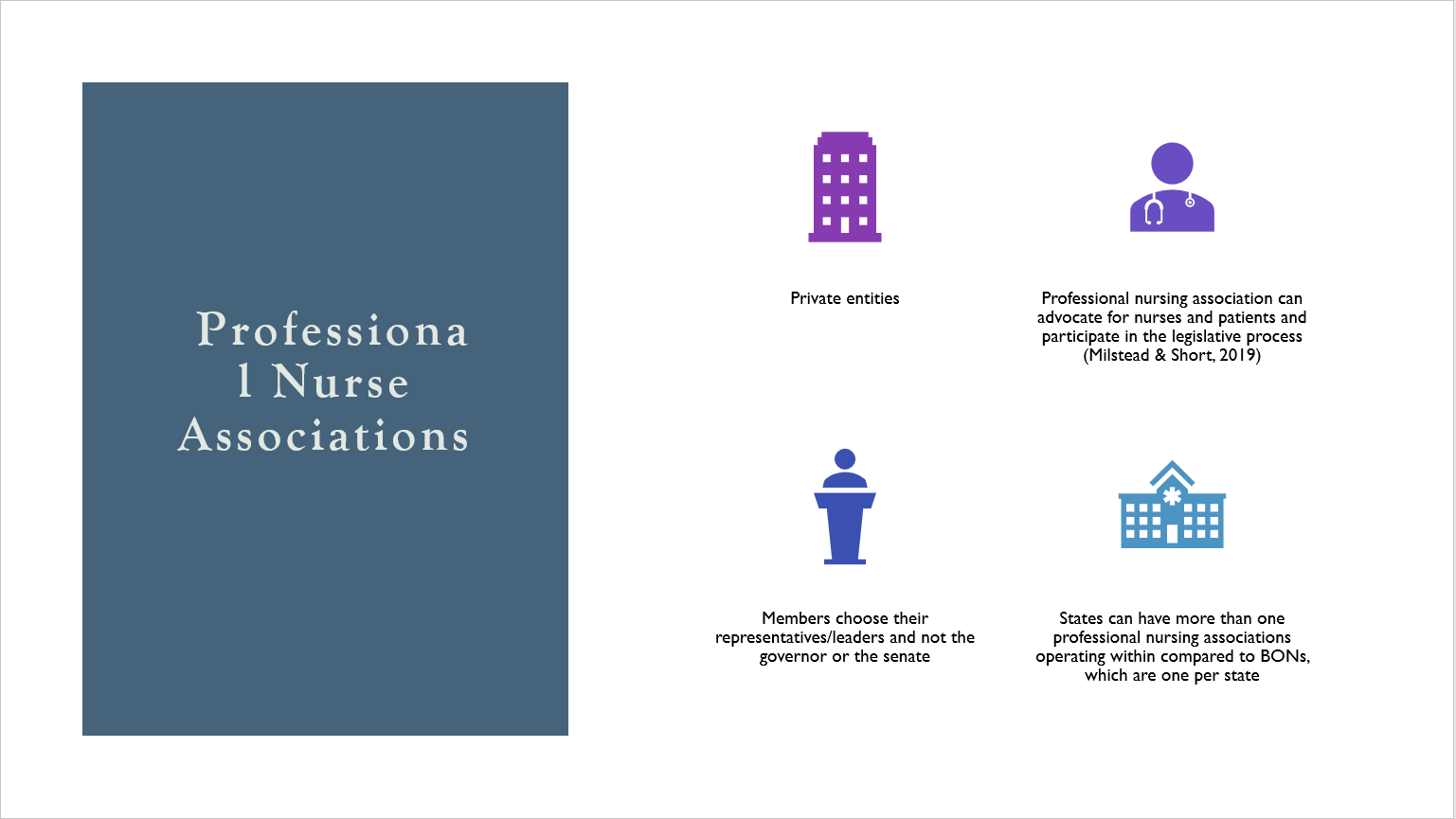
Professional nurse associations on the other hand are private entities, with their membership being primarily nurses. There are different professional nursing associations each with a different mandate of spearheading the interests of nurses and patients. Unlike BONs, professional nursing association can advocate for nurses and patients and participate in the legislative process (Milstead & Short, 2019). The membership of the different associations chooses their representatives/leader of the respective associations and not the governor or the senate. States can have more than one professional nursing associations operating within compared to BONs, which are one per state.
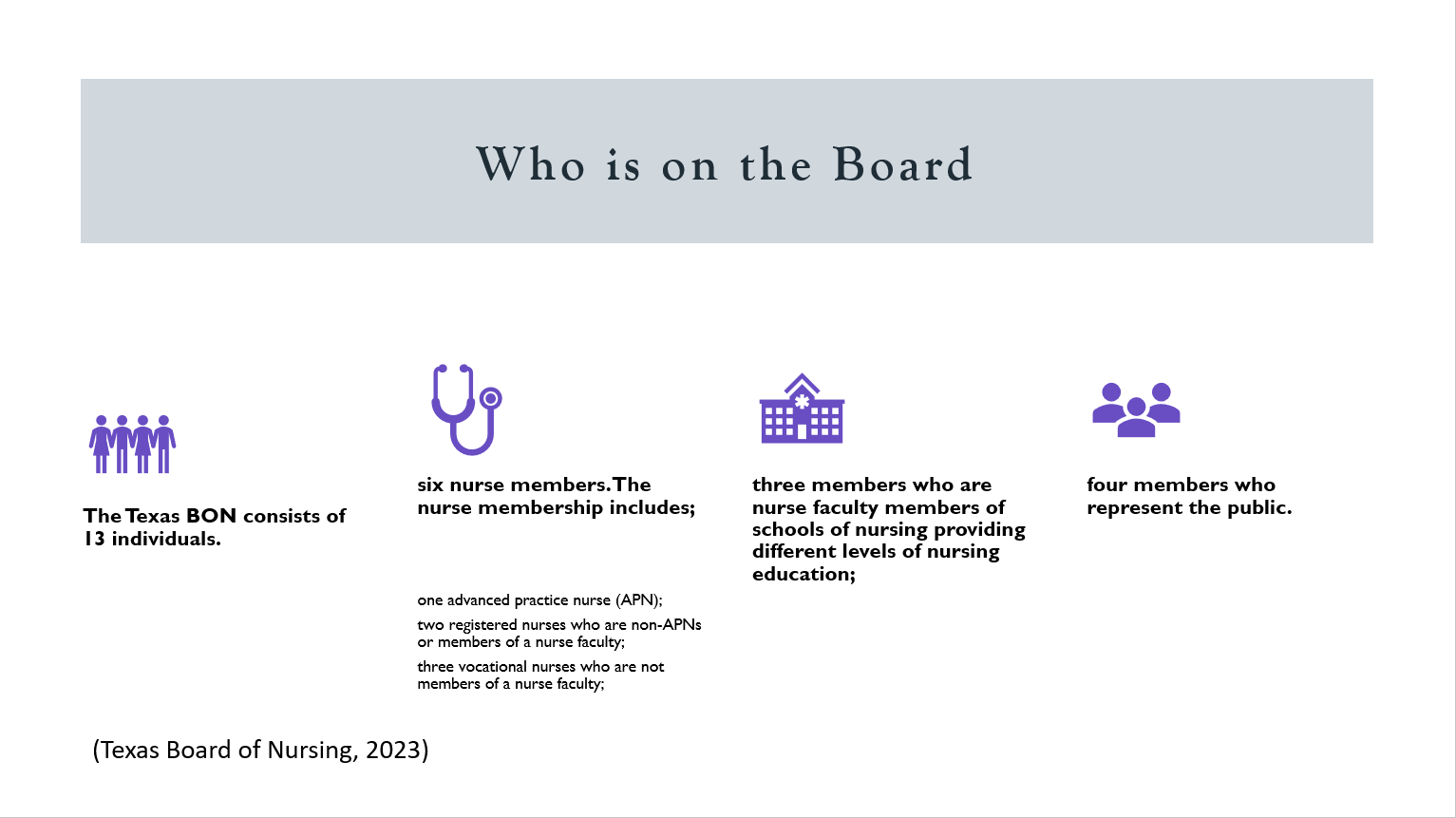
According to the Texas NPA, the membership of the Texas BON consists of 13 individuals appointed by the governor in consultation and consent of the senate. The membership includes;
- six nurse members. The nurse membership includes:
- one advanced practice nurse (APN);
- two registered nurses who are non-APNs or members of a nurse faculty; and
- three vocational nurses who are not members of a nurse faculty;
- three members who are nurse faculty members of schools of nursing providing different levels of nursing education:
- four members who represent the public.
(Texas Board of Nursing, 2023)
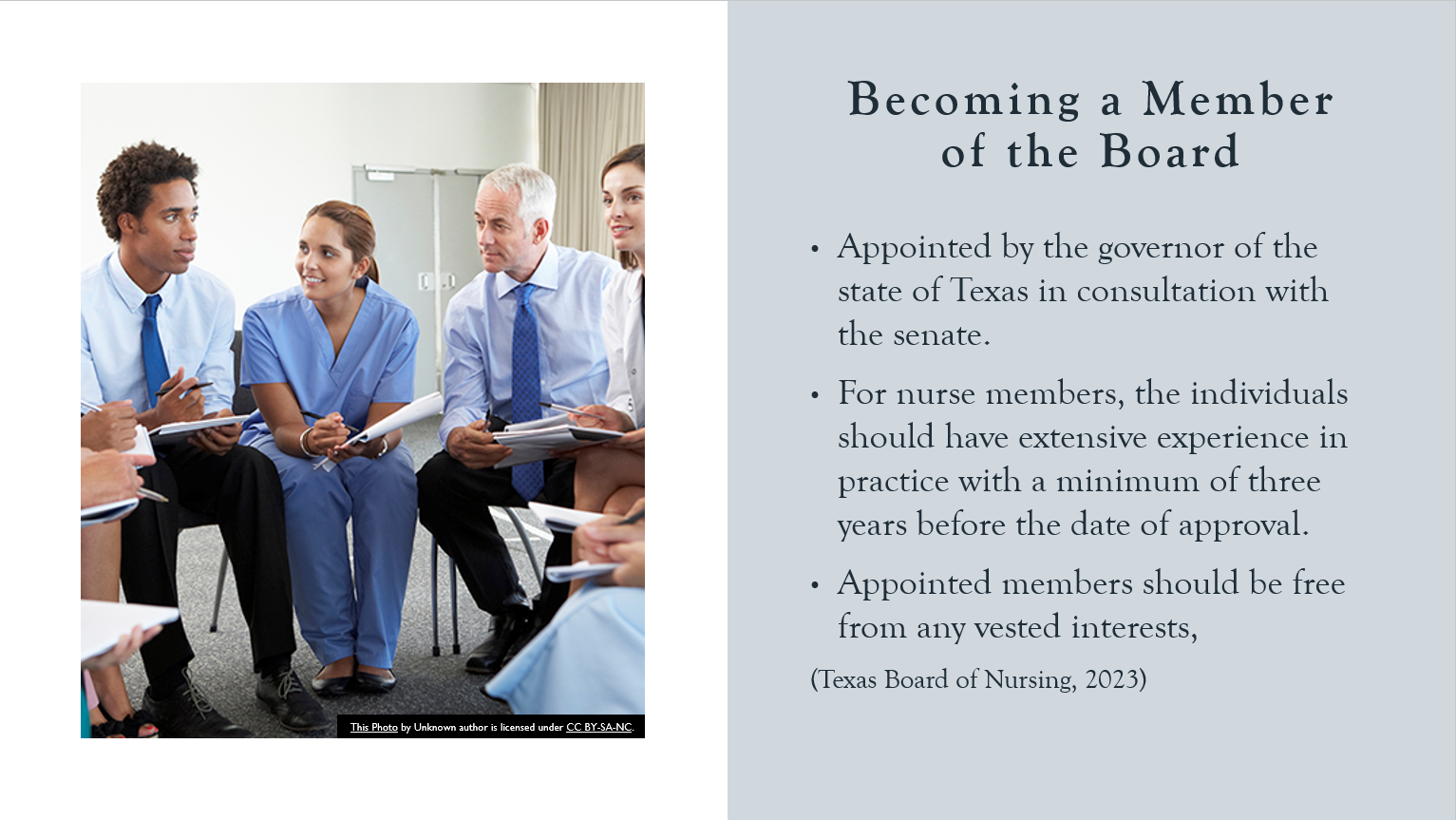
- For one to become a member of the board, they have to be appointed by the governor of the state of Texas in consultation with the senate.
- For nurse members, the individuals should have extensive experience in practice with a minimum of three years before the date of approval.
- Appointed members should be free from any vested interests, including current service in regulatory bodies or possession of businesses that offer healthcare services
(Texas Board of Nursing, 2023)
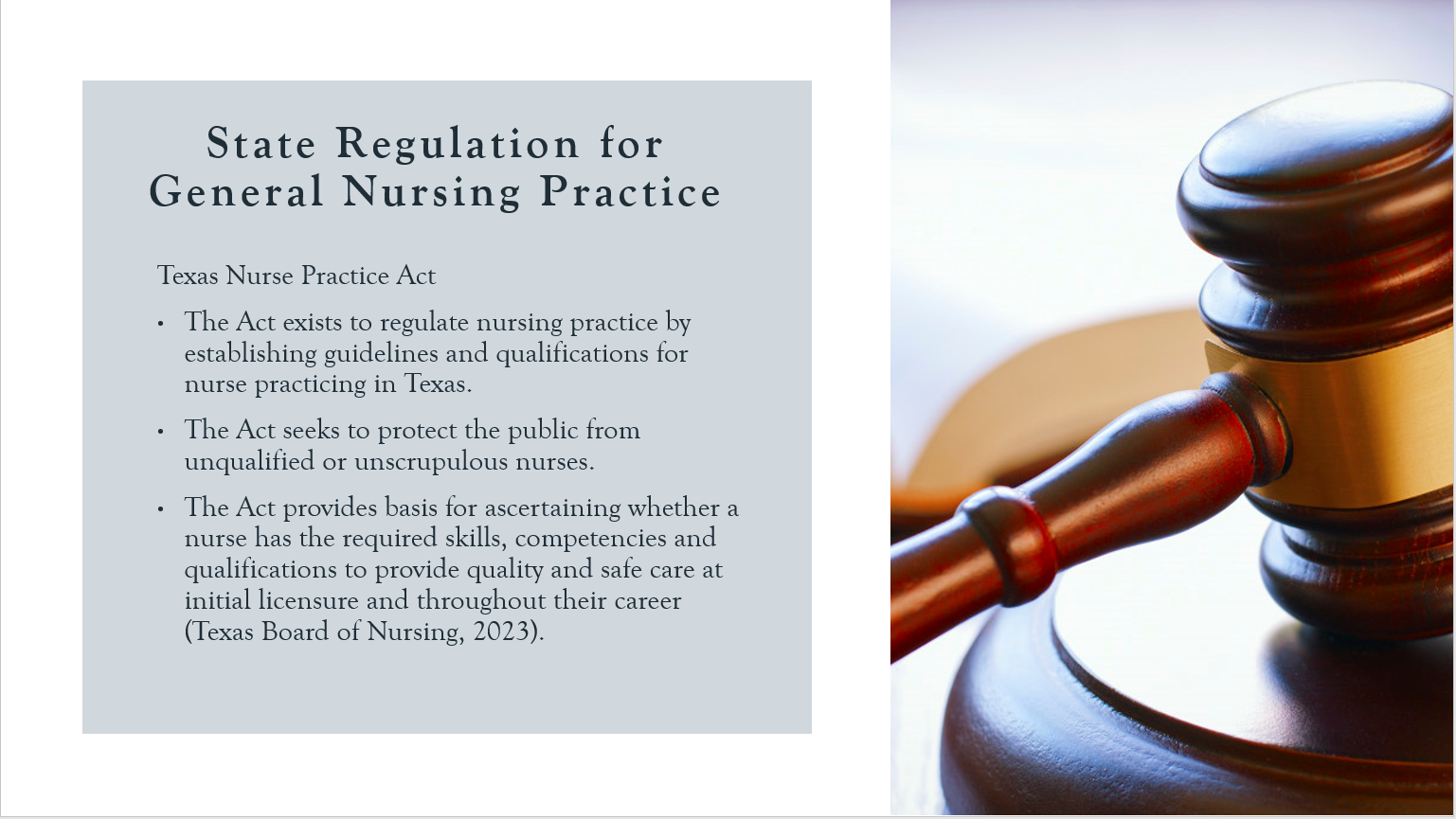
The Texas Nurse Practice Act is one of the regulations that talks about the general scope of nursing practicing in Texas.
The Act exists to regulate nursing practice by establishing guidelines and qualifications for nurse practice. The Act seeks to protect the public from unqualified or unscrupulous nurses who are a risk to the health, safety, and welfare of the citizens within the state board jurisdiction.
The Act provides basis for ascertaining whether a nurse has the required skills and competencies and qualifications to provide quality and safe care at initial licensure and throughout their career (Texas Board of Nursing, 2023).
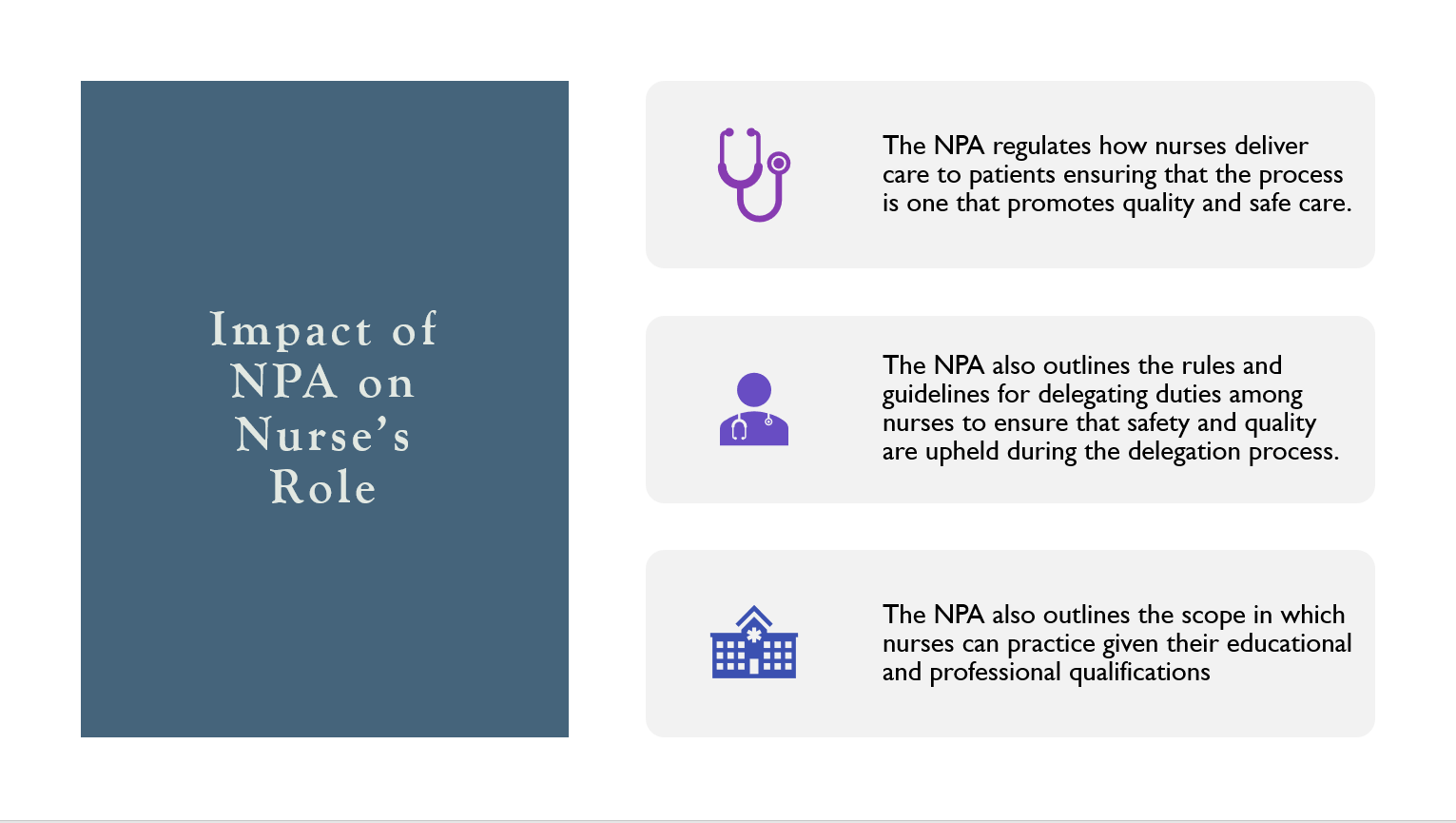
In terms of delivery- the Texas NPA has significantly improved delivery, especially in terms of quality by preventing unqualified persons from providing care and putting patients at risk (Texas Board of Nursing, 2023)
The NPA has also reduced healthcare costs by improving preventable adverse events that would have emerged from low quality care.
The NPA has also enhanced access to care by encouraging uptake, which is as a result of enhanced quality of care.
The NPA gives BONs powers to oversee care provision, which includes provision of culturally centered care free of discrimination in accordance with the nursing scope of practice.
Expert Answer and Explanation

Boards of nursing (BONs) are entities formed by the Nursing Practice Act (NPA) for each state in the United States. BONs specifically play the regulatory role and provides oversight in nursing practice in accordance with the NPA (Milstead & Short, 2019). BONs are not allowed to participate in any legislative lobbying or advocacy. BONs members are usually selected by the governor with participation of the state senate and input from other stakeholders in the healthcare industry. Each state has only one board of nursing.

Professional nurse associations on the other hand are private entities, with their membership being primarily nurses. There are different professional nursing associations each with a different mandate of spearheading the interests of nurses and patients. Unlike BONs, professional nursing association can advocate for nurses and patients and participate in the legislative process (Milstead & Short, 2019). The membership of the different associations chooses their representatives/leader of the respective associations and not the governor or the senate. States can have more than one professional nursing associations operating within compared to BONs, which are one per state.

According to the Texas NPA, the membership of the Texas BON consists of 13 individuals appointed by the governor in consultation and consent of the senate. The membership includes;
- six nurse members. The nurse membership includes:
- one advanced practice nurse (APN);
- two registered nurses who are non-APNs or members of a nurse faculty; and
- three vocational nurses who are not members of a nurse faculty;
- three members who are nurse faculty members of schools of nursing providing different levels of nursing education:
- four members who represent the public.
(Texas Board of Nursing, 2023)

- For one to become a member of the board, they have to be appointed by the governor of the state of Texas in consultation with the senate.
- For nurse members, the individuals should have extensive experience in practice with a minimum of three years before the date of approval.
- Appointed members should be free from any vested interests, including current service in regulatory bodies or possession of businesses that offer healthcare services
(Texas Board of Nursing, 2023)

The Texas Nurse Practice Act is one of the regulations that talks about the general scope of nursing practicing in Texas.
The Act exists to regulate nursing practice by establishing guidelines and qualifications for nurse practice. The Act seeks to protect the public from unqualified or unscrupulous nurses who are a risk to the health, safety, and welfare of the citizens within the state board jurisdiction.
The Act provides basis for ascertaining whether a nurse has the required skills and competencies and qualifications to provide quality and safe care at initial licensure and throughout their career (Texas Board of Nursing, 2023).

In terms of delivery- the Texas NPA has significantly improved delivery, especially in terms of quality by preventing unqualified persons from providing care and putting patients at risk (Texas Board of Nursing, 2023)
The NPA has also reduced healthcare costs by improving preventable adverse events that would have emerged from low quality care.
The NPA has also enhanced access to care by encouraging uptake, which is as a result of enhanced quality of care.
The NPA gives BONs powers to oversee care provision, which includes provision of culturally centered care free of discrimination in accordance with the nursing scope of practice.
Work with us at nursingstudyhub, and help us set you up for success with your nursing school homework and assignments, as we encourage you to become a better nurse. Your satisfaction is our goal
Claim your 20% discount!
